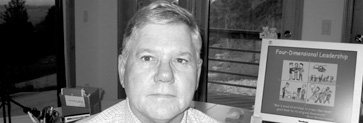Many managers are afraid to do unorthodox things. You’re not. How do you get away with it?
One of the things I’ve learned over time that makes me palatable to my system is that I take total responsibility when failures occur in my program. If somebody needs to be shot, I stand up and say “shoot me,” and I don’t offer excuses. I take clear responsibility, even when there are things not clearly within my control. Our system adores that. So often, when things go awry, it’s hard to find who’s responsible. We have a tendency to want to blur accountability, to make it so that no one’s really accountable, or everyone is, which is the same as no one.
Did you always manage this way?
I don’t know, perhaps you should ask the people I worked with. I don’t feel any more or less confident. I don’t know why that is. I think that says more about how I was at 35 than the way I am now.
How do you keep the intensity from burning out after 20 years?
It’s really a passion for what I do, more than an intensity. A passion for success, for the team succeeding, for doing remarkable things. As I’ve gotten older the passion has not diminished, but I’ve mellowed. What I see most lacking in younger managers is this passion.
You’ve brought along younger project managers. What sort of processes do you use in mentoring them?
We talk about what they need to do to be more effective leaders. I give them my view of their strengths and weaknesses. Ultimately, I think the most effective leaders develop their styles by emulating others, as opposed to reading about it. When they see things that work and are consistent with what they can do, I tell them they should adopt those practices as part of their style. I encourage them to be observant about the mundane things that happen every day. In the end, it’s not the big victories or catastrophes that make leaders stand out, it’s the everyday things that happen. All of us learn from big victories and catastrophes, but not a lot of us learn from the everyday things that happen. What I try to do is encourage the people I mentor to think about the everyday things they see. What insights did you gain from these experiences?
At a recent NASA forum, you said that the entire team has to buy into the objectives of a project. How do you get them to go beyond that and feel passionate about it?
Let me tell you a story. When I first came to my program, my predecessor had been fired; even now I’m not sure of the exact reasons. I was given this job to get the project underway in four months. My predecessor had said it couldn’t be done that quickly, that it would take at least a year. My very first meeting with the team was the first day after the Christmas holidays, and I told them we are going to get this project under way in four months, and I told them point blank it was up to them to figure out how. Everyone said no, no, we’ve been working on this for a couple of months already. We’ve looked at this from every possible angle, and there’s no way we can get this underway in less than a year. I said I’d be back in two hours and expect to hear from you as a group what we’re going to do to get this under way in four months. I came back two hours later, we were in this auditorium, and they had elected a spokesman. The spokesman stood up and said they’d gone over everything and looked at everything and there was no way we could do this in less than a year. And as I listened to them, I really couldn’t help myself, and I started to cry. The tears ran down my face and I got a lump in my throat, and I said, “You’re going to make me do this by myself, aren’t you?” The spokesman looked around at his colleagues and said, “Give us another hour.” When I came back, they had it all laid out.
Don’t some people, though, get hostile when you impose what may seem to them like unreasonable demands?
What you’ve got to do is provoke unconventional thinking. You create a situation where the status quo, the conventional approach, business-as-usual won’t get you there. Until you’re able to turn that light on in people’s heads, you’re not going to stimulate innovative, creative thinking. That’s how you combat hostility. If they’re being creative, they’re too engaged in what they’re doing to be hostile. In that project I just told you about, by moving the goal up to what seemed unachievable to them two things were also happening. One is they thought I knew it could be done. ‘He obviously must think there’s a way to do this, even though we haven’t figured it out’ — which was not true, by the way. The other thing was that it was such a dramatic difference from the manager they had before that nothing they knew within their core experience made sense to them anymore. ‘He’s given us this unreasonable problem, so I guess we’re going to have to come up with an unreasonable solution,’ and that’s exactly what happened. It was a challenge to them, and they met it.
Isn’t burnout inevitable over twenty years of passionate involvement in your work?
Yes, of course. But I think when people get to that point, and ideally before they get ALL the way to that point, they need to be put in a kind of rehabilitation mode. And it needs to be okay. When you operate over a long period of time with passion, then burnout is inevitable, but you can rejuvenate yourself. You can come back to where you were if you can have a rest — a sabbatical, so to speak — and you have to know it’s okay. You have to have someone above you who’s willing to accommodate that kind of situation.
If it’s inevitable, then I assume you were there. Can you describe your rehabilitation?
This was about ten years ago, and I was exhausted and wanted to retire. I asked for and was given a different job for a period of time. This was something that didn’t involve the success or failure of the program, something that I could bring my skills to bear on, but it wasn’t something that I felt passionate about. It was okay just to do a good job. It took about a year to get back to the point that I was rejuvenated and ready to charge forth again. And I was okay.
Would you ever remove someone who seemed to be burning out or suffering a loss of passion for the project?
I think someone who is exhausted and unwilling to admit it, unwilling to take action, is not doing the team a service. But when you’ve been a part of a project from the start so that it becomes your project and you own it, even if you’re not as effective as maybe someone else would be, I think there’s a moral obligation to allow that person to see it to closure. When it’s yours and you own it, it’s cruel to take it away and hand it off to someone who doesn’t own it and doesn’t have the investment in it that you have.
What do you enjoy most about being a manager?
Generally speaking, it’s been watching the team coalesce and begin to see themselves as something special, something different, something radical and powerful, something exciting to be part of. Knowing that I had a part in sparking the flame that caused this to happen is very special to me. Teams aren’t self-sustaining, generally. They need to be nurtured, but what I’ve observed is that a winning team seems to keep winning, and that’s no accident, because a team begins to develop its own power, its own sense of how to operate, its own confidence in its ability. Successful teams tend to operate with a certain kind of intimacy among members that over time creates really powerful results.
And how do you as the leader of this group help create that intimacy? I try to sit down with every person who works for me and talk to him or her in their workspace at least once every two months. It’s not necessarily serious talk — although sometimes it is — sometimes it’s about their family or a hobby that I know they’re interested in. In the end, what remains is only the effect that we have on other people. Yes, projects get done — they’re successful. But to me, I find less satisfaction in that than in the positive effect I’ve had on other people. I think we’re moving away from the dogmatic view that project management is a science. It’s an art that at its most fundamental level has to do with people.









